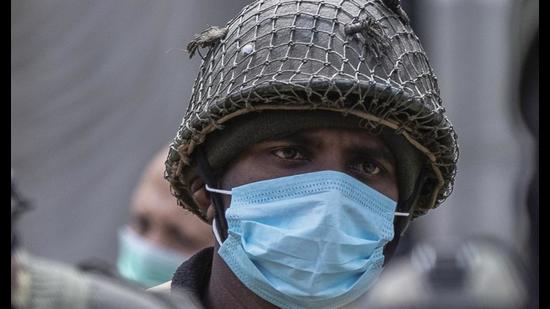In India’s Covid war, the role of the fauj
The Covid-19 tsunami is expected to continue in India till at least the end of May, and remain an issue of concern for the rest of the year. Hence maximising the institutional capacity of the military in the war against Covid-19, without diluting its primary operational orientation, in the backdrop of a resource crunch, is the task ahead for the Indian political and defence leadership.
India’s Covid-19 crisis and the extraordinary surge in the second wave have become a matter of global concern. Public policy experts have offered professional advice based on their own national experiences. In a recent interview with The Indian Express, Anthony S Fauci, the chief medical adviser to the president of the United States, compared the current public health challenge to a war and referred to the Indian military. He noted: “What is the role of the (Indian) military? Can the military come in and help?” Fauci added: “You should think of this, in some respects, like a war. The enemy is the virus. It is almost like wartime because it’s an emergency.”

Since the pandemic was acknowledged as a major national challenge in March 2020, the Indian military has been providing “aid to civil power” in a variety of ways. When the virus was spreading slowly last year, the fauj helped set up quarantine facilities and assisted in the evacuation of Indian citizens stranded abroad. Special military medical teams were also sent to some neighbouring nations to help establish Covid-testing facilities.
In recent weeks, when the virulence of the second wave called for emergency measures, transport aircraft of the Indian Air Force ferried much-needed oxygen and other medical supplies from donor nations. The Indian Navy carried medical supplies from the neighbourhood. The Indian Army, which has the largest footprint across the nation, created dedicated Covid-19 facilities for civilians, and military medical personnel are at the forefront in hospitals set up by the Defence Research and Development Organisation (DRDO). Prime Minister Narendra Modi has also met with the military top brass and emergency measures have been put in place to enable the military to provide assistance to the Covid-19-afflicted.
However, while recognising the contribution of the military to India’s Covid-19 effort, the answer to Fauci’s query (can the military come in and help?) is yes — but only when such help is sought by the civilian government. Every nation evolves its civil-military template — and it is important that this balance is not upset. The military must and will help, but it cannot be suddenly expected to fill in all the deficits caused by entirely avoidable policy mistakes of the civilian domain.
The primary role of the military is to safeguard national integrity, counter territorial challenges and prepare for war to deter any adventurism. The past year has been particularly taxing for the Indian military — China’s incursions across the Line of Actual Control, and the subsequent Galwan setback, occurred due to the pandemic-induced disruption of the Army’s annual deployment in Ladakh.
The Covid-19 tsunami is expected to continue in India till at least the end of May, and remain an issue of concern for the rest of the year. Hence maximising the institutional capacity of the military in the war against Covid-19, without diluting its primary operational orientation, in the backdrop of a resource crunch, is the task ahead for the Indian political and defence leadership. The military’s core characteristics are professional competence, innovation in the face of adversity, proven organisational acumen and a deeply ingrained spirit of selfless service. Add to this the intrinsic training ethos of the military and some policy options can be identified.
A key immediate, and medium-term, Covid-19 management objective for India will be to create across-the- broad capacity to avoid the kind of tragic situation of today, most visible in oxygen shortages. Only last week, to address the dire shortage of oxygen in Agra district, the local army and air force helped the district administration set up a new oxygen plant that was completed in a record seven days. Further, the army’s technical corps, the electronics and mechanical engineers (EME) in Agra, repaired a local oxygen manufacturing unit that was non-operational for a few years. It has now been entrusted with a similar task to repair a plant in Saifai. Policymakers must think about whether this kind of civilian-military partnership to boost oxygen production can be replicated on a wider scale and under what conditions.
The next Covid-19 crisis for India will be a shortage of trained medical staff — doctors-nurses-paramedics. A large number of under trainees are in the final stages of completing their courses in medical colleges, and the military can play a role in bringing them into the mainstream with focused and rigorous final grooming — in a matter of weeks. Just as the Indian military had trained thousands of young citizens in the mid-1960’s in a warlike environment, it can significantly augment medical human resources capacity.
A few high-risk, meagre infrastructure districts can be entrusted to the military for relief and can be scaled up judiciously. Further, the community of retired military veterans is a large, disciplined pool and can be encouraged to join the effort. They can be pulled in for the tasks of coordination, logistics management, and direct medical assistance in the case of trained personnel, among other measures.
But all such initiatives will need careful planning, based on envisioning an effective role for the military in pandemic management. Exploiting the military for short-term political advantage and optics (for instance, the location of the first set of DRDO hospitals in Varanasi, Lucknow and Ahmedabad have generated questions) must be avoided. When the death toll is moving towards half a million, the situation, alas, is grim and warlike, requiring all of India’s institutions to weigh in.
C Uday Bhaskar is the director of Society for Policy Studies
The views expressed are personal



